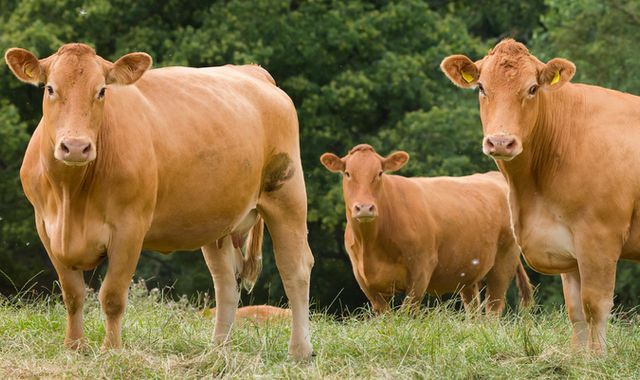On Air Now
Official Big Top 40 from Global 4pm - 7pm
7 May 2024, 09:52 | Updated: 7 May 2024, 14:26

Farmers have been warned a new strain of an animal virus has a "very high" probability of affecting livestock in the UK.
Bluetongue is a disease which affects domesticated animals like cattle and sheep and is spread through biting midges.
Symptoms include a blue and swollen tongue, fever, reduced milk yield and death in the most severe cases.
While it does not affect humans or food safety, the government is warning a new strain of the virus is likely to be brought to the UK by midges from northern Europe that are blown over by strong winds.
It comes after a new strain of bluetongue - dubbed BTV-3 - emerged in the Netherlands in September 2023. It was then detected in England two months later.
There have since been 126 cases, affecting seven sheep and 119 cattle, across Kent, Norfolk, Suffolk and Surrey.
Read more from Sky News:
Close-up photos of bees inspire Liverpool exhibition
UK water sports demand crackdown on sewage
In a risk assessment published on Tuesday, the Animal and Plant Health Agency (APHA) warned there is a very high probability of the new strain being brought into Britain throughout the year.
It added there is also a medium risk of another strain, BTV-8, being carried in by midges blown from northern France.
Biosecurity minister Lord Douglas Miller said in a statement "we must not be complacent to the bluetongue virus risk and the challenge this could pose to our livestock sector".
He added: "Once the risk of transmission increases, we will also be offering free bluetongue tests to keepers in high-risk counties and we are actively engaging with vaccine manufacturers on the development of a BTV-3 vaccine for use in the UK."
There is currently no vaccine in the UK for the BTV-3 strain. A new vaccine has been approved for emergency use from the start of May in the Netherlands and Belgium, however.
(c) Sky News 2024: Bluetongue: Government warns 'high probability' new strain of animal virus could spread to UK cattle